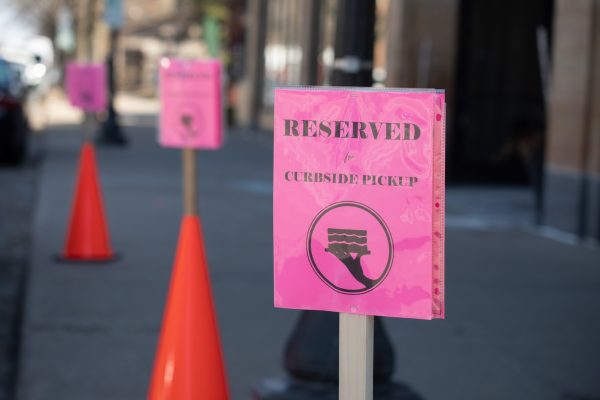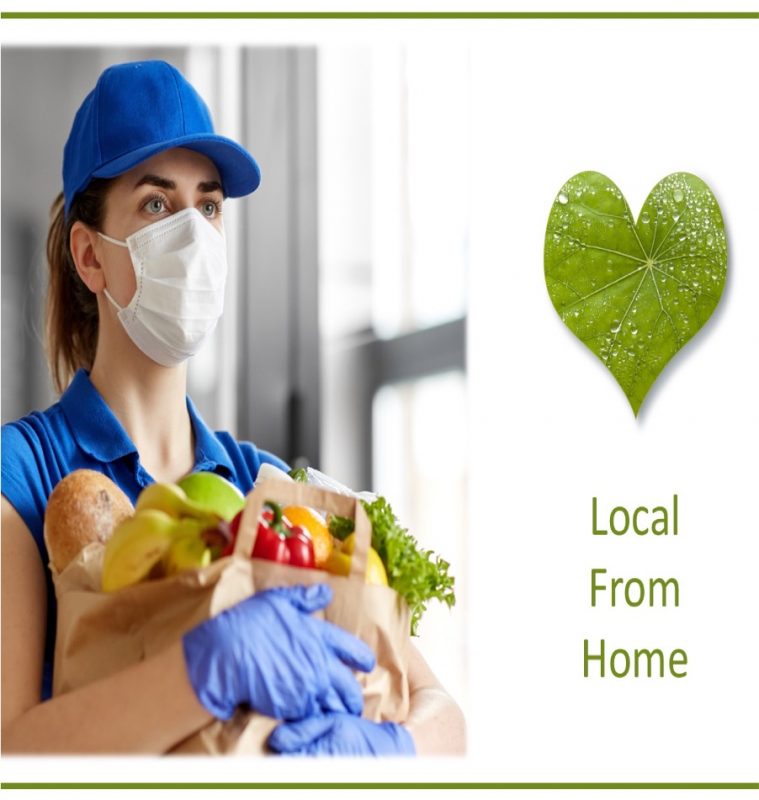While we “Stay the Blazes Home” in Nova Scotia, free delivery and curbside pick-up are playing a vital role in sustaining our communities.
It’s impressive how quickly and efficiently small indie businesses are pivoting to keep safely servicing their customers. I’m also heartened by the growing number of community members using these services to support small local businesses.
Actively sourcing from small local businesses will help the economy recover much faster from the effects of COVID-19. You can learn more about why this is true in our nifty explainer video here.
Why Big Grocery Stores Couldn’t Deliver
Some Big Box Stores have been offering free delivery of online orders of household goods. A nice gesture of support during trying financial times. However, they were not able to pivot quickly enough to meet more urgent customer needs—such as food delivery. Even Superstores, which already had pickup services, were not able to provide home delivery.
The wheels of corporations turn slowly. There are so many moving parts to their global supply chains that they can’t adapt quickly enough to respond to urgent and critical changes. They simply couldn’t keep up with the changing customer needs brought about by the rapid spread of COVID-19.
Why Small Local Food Providers Could
 In contrast, small local businesses, like Halifax Bread Factory, were able to quickly create a streamlined process of receiving online orders. Within days, many had established free delivery and curbside pickup processes to service their customers.
In contrast, small local businesses, like Halifax Bread Factory, were able to quickly create a streamlined process of receiving online orders. Within days, many had established free delivery and curbside pickup processes to service their customers.
Similarly, many Farmer’s Markets quickly facilitated online purchasing, curbside pick-up, and home delivery options. Some, like Wolfville Farmers Market, have even expanded beyond their hyper-local reach by delivering to nearby city hubs like Halifax and Dartmouth.
The ability to adapt to customer needs quickly and responsively is a huge advantage that small independent businesses have over big corporates. Larger companies need investment in hardware, software, and human resources for even the smallest of changes. And, typically, they don’t have the same close relationship with their customers to hear and respond quickly to their needs.
This nimble responsiveness to customer needs has opened up a whole new avenue of potential customers for small indie businesses in Nova Scotia. Now, folks who previously couldn’t easily get to the markets, can have these local offerings delivered right to their door. Something most of us will definitely want to continue even when we’re able to get out and about more freely again.
Why Over-Reliance on Global Supply Chains Makes Us Vulnerable
The fragility of our over-reliance on global supply chains is now abundantly clear. This February article from Harvard Business Review is positively prophetic in hind-site. Everything they predicted about the effects of COVID-19 on the Global Supply Chain has happened—and more.
Not only has COVID-19 disrupted the global supply chain, but our highly integrated global economy has facilitated it’s rapid spread. It’s not that COVID-19 is more contagious than previous viral outbreaks. It’s that we travel more for work and vacations than ever before. It’s why regions that have imposed travel restrictions, social distancing & contact tracing have been more effective at reducing the spread of COVID-19.
How Fully Integrating Local and Global Supply Chains Could Help
This article by Samantha Radocchia, sums up the impact of global supply chains quite nicely:
“Initially, global supply chains simplified production and gave early adopters a competitive advantage. Now, they’re standard, and they’re often quite complicated and confusing. They’ve gotten so complex that they’ve become riddled with new problems and challenges.”
She also notes that the global infrastructure is not going anywhere soon. Yet suggests that there are ways of integrating local suppliers more effectively in the global supply chain:
“The global genie is out of the bottle. What will emerge instead will be a combination of the local and the global.”
 Radocchia proposes an intriguing alternative. Rather than overproducing consumables in large factories and shipping globally, we could flip our production approach. Creating a system where technologies (such as 3-D printing and blockchain) would enable making products as needed from local suppliers. A process that would significantly reduce waste and carbon emissions while growing both local & global economies alike.
Radocchia proposes an intriguing alternative. Rather than overproducing consumables in large factories and shipping globally, we could flip our production approach. Creating a system where technologies (such as 3-D printing and blockchain) would enable making products as needed from local suppliers. A process that would significantly reduce waste and carbon emissions while growing both local & global economies alike.
I’m interested to see exactly how this integration of global and local could play out. And the related technologies that would support and emerge from it.
Though It’s exciting to look at what a more sustainable future could look like, for the moment, let’s get back to the current situation. Let’s see how small independent businesses are innovating and strengthening our local supply chains now.
How Delivery and Curbside Pickup are Strengthening Local Supply Chains
I already mentioned the Wolfville Farmers Market’s online shopping supported by delivery and curbside pick-up options. This has opened up their market vendors’ unique offerings to a much broader potential customer base. The key is helping more folks connect with the market vendors online and facilitating the safe and easy acquisition of these unique local products. This has already helped strengthen Nova Scotia’s local economy—by providing broader access and the infrastructure to deliver these goods. Presto! Local supply chain enhanced!
Now this is just one example of how buy-local organizations are broadening their accessibility and reach through online access. Many individual small independent food and drink providers are doing similar. For example, Boxing Rock and other local craft brewers & distilleries are also providing delivery and/or curbside pickup. Many are also hosting cool virtual events to stay connected with their customers.
Another example of leveraging the online space to broaden the local supply chain is Discover Halifax’s Directory, listing Halifax vendors that are still safely servicing customers during social distancing. If you’re looking for cool new local dining and/or gifting options do check it out.
Caveat: “Free Delivery” Isn’t Free for Small Businesses
Though some small businesses have been able to offer free delivery, many will need to charge for this service. They would love to offer it, but simply cannot cover the actual business expense of doing so.
I’ve highlighted Free Delivery a few times in this blog. However, paid-for delivery services are equally important in bolstering our local supply chain. Increased online access and delivery options (paid & free) strengthen our local economies. I’m willing to pay a fee to get locally sourced products delivered to my home. And I know I’m not alone. Bringing delicious local refreshments to my doorstep? Very happy to pay for that!
Why Connecting with More Small Local Businesses is So Important for Economic Recovery
 Not to belabour the point.
Not to belabour the point.
Ok. You got me. Absolutely to belabour the point.
The more we’re able to purchase from small independent local providers the better for us all. It strengthens local economies as well as contributes to a positive snowball effect of personal, social, and environmental gains. I recently wrote about the multiple benefits of buying small indie and local that you can read here, if you’d like to find out more about how this all plays out.
We’ve got a thriving and growing community of buy-local shoppers here in Nova Scotia. All are actively seeking out more small local options for their goods and services needs.
And, we created this small and local business platform to help them do exactly that.
I’d love to hear about supporting local initiatives that have inspired you. Please post them in the comments so we can all have a closer look 🙂
